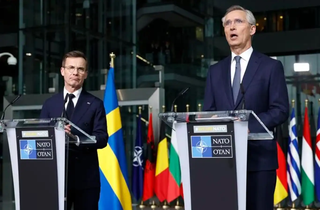This comes two years after Russia's invasion of Ukraine prompted a historic shift in Swedish foreign policy.
Sweden's Commitment to NATO
During a flag-raising ceremony, both Swedish Prime Minister Ulf Kristersson and NATO Secretary-General Jens Stoltenberg addressed the gathering. Prime Minister Kristersson acknowledged the "high" expectations placed on Sweden and emphasized their commitment to the alliance's values. He pledged to uphold the principles outlined in the founding Washington Treaty.
A Response to Russia's Aggression
Stoltenberg framed Sweden's accession as a counterpoint to Russia's aggression. He declared that Russian President Vladimir Putin's strategy of weakening NATO through the war in Ukraine had backfired. Stoltenberg highlighted Ukraine's closer ties with the alliance despite the ongoing conflict.
Joint Military Drills Underscore Strength
Coinciding with the flag-raising ceremony, a large-scale NATO military exercise commenced in the Nordic region. The drills, involving 20,000 troops from 13 countries, are taking place across Sweden, Finland, and Norway.
A Long Road to Membership
Sweden's journey to NATO membership began alongside Finland's application in 2022, following Russia's invasion of Ukraine. However, the process faced delays due to objections from Turkey and Hungary. Both countries ultimately approved Sweden's membership in early 2024, paving the way for full integration.
Strategic Advantages of Sweden's Membership
The addition of Sweden strengthens NATO with well-trained and equipped armed forces. Sweden's advanced submarines and domestically-produced Gripen fighter jets will be valuable assets. Furthermore, their geographic location will serve as a crucial link between the Atlantic and Baltic regions. (ILKHA)



 Dünya
Dünya
 Güncel
Güncel
 Güncel
Güncel
 Güncel
Güncel
 Güncel
Güncel
 Dünya
Dünya
 Güncel
Güncel
 Güncel
Güncel
 Sağlık
Sağlık
 Güncel
Güncel





